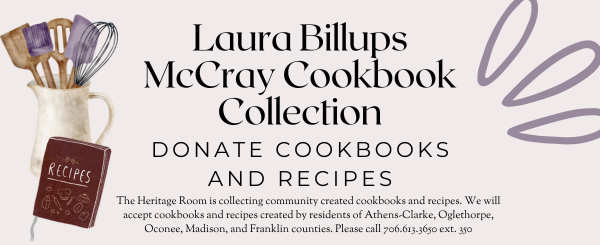
For years the Heritage Room has collected community created cookbooks, as well as books related to food from authors living in or from Athens-Clarke County. We have now named the collection and taken a dedicated effort to collect these titles. The Laura Billups Community Cookbook Collection has been named for “Aunt” Laura Billups McCray. Aunt Laura, as she was affectionately known, was formerly enslaved, yet built a wildly successful baking business here in Clarke County. Born Laura McCray June 7, 1818, in Wilkes County, Georgia, to Dolly Billups, enslaved by Colonel John Billups. Aunt Laura, as she is known in newspaper articles published throughout the southeast during her lifetime, is mostly known in legal documents as Laura McCray. Laura was freed by 1865, at the age of 47. By 1889 she was within the top twelve wealthiest African Americans in Clarke County. Her home and bakery sat on the south side of Prince Avenue between Franklin Street and Milledge Avenue–right next door to Monroe B. “Pink” Morton.
According to an article about Laura, published in the 2018 issue of the Athens Historian produced by Athens Historical Society and written by Eve B. Mayes, a female, either Laura’s niece or daughter, had four children. These children and their mother are often recorded as nieces and grand nieces and nephews, but have also been recorded in records as her children and grandchildren. Some more research will need to be done in order to solve this quandary. We have since discovered with the help of other local researchers that Laura McCray does have descendants who are no longer living in Georgia. And they are now aware of this collection honoring her legacy as an entrepreneur and prolific baker. “Aunt” Laura Billups McCray built quite a following. It was known that if a bride did not have an “Aunt” Laura cake at her wedding then what was the point of being married. It was essential to every “proper” southern wedding to have a cake by Aunt Laura. No one knew her secret to the best cakes in the south, but they have been described as the most moist, delicious cakes in all the land. There are the many sentiments captured in local Athens newspapers during Laura’s career.
Laura Billups McCray spent years enslaved by, working for, and generally serving the needs of white people in the City of Athens and more widely throughout the state of Georgia. Her obituary in the Athens Banner, December 9, 1913, states, “For every one who knew her did love Aunt Laura with the love that existed between the masters and the servants in ante-bellum days. She was a good woman and her influence will long be felt in this community where for fifty years by example she tried to bring about a perfect understanding between the white race and her own; with what success was shown by the number who with tear-dimmed eyes gathered round her bier.” Michael Twitty, well known southern food writer and historian writes, “In America, and especially the American South, ‘race’ endures alongside the sociopolitics of food; it is not a stretch to say that race is both on and at the Southern table. But if it is on the table alone we have learned nothing; we continue to reduce each other to stereotypical essences.” Laura Billups McCray was caught within a world of massive racism and romanticization of plantation culture and life, but she found a way to earn a good living while also navigating the sociopolitical world of southern life during Reconstruction and Industrialization.
The Athens-Clarke County Library Heritage Room honors Laura Billups McCray as the entrepreneur, master baker, and community member she embodied. Oftentimes southern food is not properly described and neither are the contributions of African Americans, or the formerly enslaved, properly recognized for the deep influence on southern food ways. Laura Billups McCray is southern food; enslaved persons food, is southern food. Let us not forget that American food is largely composed of influences from enslaved persons, immigrants, and largely the peasant classes of which comprises the majority of its citizens. We are happy to honor Laura Billups McCray as the woman she was, a master baker, a kind and giving soul, and African American.

If you have questions about the collection or would like to donate a community cookbook, loose recipes, or other archival material please email heritageroomref@athenslibrary.org or call (706) 613-3650 ext. 350.

